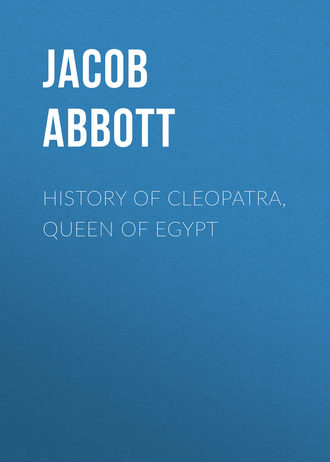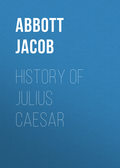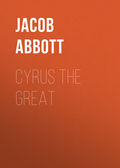
Abbott Jacob
History of Cleopatra, Queen of Egypt
The forces on the two sides were nearly equal; but on the Republican side, that is, on the part of Brutus and Cassius, there was great inconvenience and suffering for want of a sufficient supply of provisions and stores. There was some difference of opinion between Brutus and Cassius in respect to what it was best for them to do. Brutus was inclined to give the enemy battle. Cassius was reluctant to do so, since, under the circumstances in which they were placed, he considered it unwise to hazard, as they necessarily must do, the whole success of their cause to the chances of a single battle. A council of war was convened, and the various officers were asked to give their opinions. In this conference, one of the officers having recommended to postpone the conflict to the next winter, Brutus asked him what advantage he hoped to attain by such delay. “If I gain nothing else,” replied the officer, “I shall live so much the longer.” This answer touched Cassius’s pride and military sense of honor. Rather than concur in a counsel which was thus, on the part of one of its advocates at least, dictated by what he considered an inglorious love of life, he preferred to retract his opinion. It was agreed by the council that the army should maintain its ground and give the enemy battle. The officers then repaired to their respective camps.
Brutus was greatly pleased at this decision. To fight the battle had been his original desire, and as his counsels had prevailed, he was, of course, gratified with the prospect for the morrow. He arranged a sumptuous entertainment in his tent, and invited all the officers of his division of the army to sup with him. The party spent the night in convivial pleasures, and in mutual congratulations at the prospect of the victory which, as they believed, awaited them on the morrow. Brutus entertained his guests with brilliant conversation all the evening, and inspired them with his own confident anticipations of success in the conflict which was to ensue.
Cassius, on the other hand, in his camp by the sea, was silent and desponding. He supped privately with a few intimate friends. On rising from the table, he took one of his officers aside, and, pressing his hand, said to him that he felt great misgivings in respect to the result of the contest. “It is against my judgment,” said he, “that we thus hazard the liberty of Rome on the event of one battle, fought under such circumstances as these. Whatever is the result, I wish you to bear me witness hereafter that I was forced into this measure by circumstances that I could not control. I suppose, however, that I ought to take courage, notwithstanding the reasons that I have for these gloomy forebodings. Let us, therefore, hope for the best; and come and sup with me again to-morrow night. To-morrow is my birth-day.”
The next morning, the scarlet mantle – the customary signal displayed in Roman camps on the morning of a day of battle – was seen at the tops of the tents of the two commanding generals, waving there in the air like a banner. While the troops, in obedience to this signal, were preparing themselves for the conflict, the two generals went to meet each other at a point midway between their two encampments, for a final consultation and agreement in respect to the arrangements of the day. When this business was concluded, and they were about to separate, in order to proceed each to his own sphere of duty, Cassius asked Brutus what he intended to do in case the day should go against them. “We hope for the best,” said he, “and pray that the gods may grant us the victory in this most momentous crisis. But we must remember that it is the greatest and the most momentous of human affairs that are always the most uncertain, and we can not foresee what is to-day to be the result of the battle. If it goes against us, what do you intend to do? Do you intend to escape, or to die?”
“When I was a young man,” said Brutus, in reply, “and looked at this subject only as a question of theory, I thought it wrong for a man ever to take his own life. However great the evils that threatened him, and however desperate his condition, I considered it his duty to live, and to wait patiently for better times. But now, placed in the position in which I am, I see the subject in a different light. If we do not gain the battle this day, I shall consider all hope and possibility of saving our country forever gone, and I shall not leave the field of battle alive.”
Cassius, in his despondency, had made the same resolution for himself before, and he was rejoiced to hear Brutus utter these sentiments. He grasped his colleague’s hand with a countenance expressive of the greatest animation and pleasure, and bade him farewell, saying, “We will go out boldly to face the enemy. For we are certain either that we shall conquer them, or that we shall have nothing to fear from their victory over us.”
Cassius’s dejection, and the tendency of his mind to take a despairing view of the prospects of the cause in which he was engaged, were owing, in some measure, to certain unfavorable omens which he had observed. These omens, though really frivolous and wholly unworthy of attention, seem to have had great influence upon him, notwithstanding his general intelligence, and the remarkable strength and energy of his character. They were as follows:
In offering certain sacrifices, he was to wear, according to the usage prescribed on such occasions, a garland of flowers, and it happened that the officer who brought the garland, by mistake or accident, presented it wrong side before. Again, in some procession which was formed, and in which a certain image of gold, made in honor of him, was borne, the bearer of it stumbled and fell, and the image was thrown upon the ground. This was a very dark presage of impending calamity. Then a great number of vultures and other birds of prey were seen, for a number of days before the battle, hovering over the Roman army; and several swarms of bees were found within the precincts of the camp. So alarming was this last indication, that the officers altered the line of the intrenchments so as to shut out the ill-omened spot from the camp. These and other such things had great influence upon the mind of Cassius, in convincing him that some great disaster was impending over him.
Nor was Brutus himself without warnings of this character, though they seem to have had less power to produce any serious impression upon his mind than in the case of Cassius. The most extraordinary warning which Brutus received, according to the story of his ancient historians, was by a supernatural apparition which he saw, some time before, while he was in Asia Minor. He was encamped near the city of Sardis at that time. He was always accustomed to sleep very little, and would often, it was said, when all his officers had retired, and the camp was still, sit alone in his tent, sometimes reading, and sometimes revolving the anxious cares which were always pressing upon his mind. One night he was thus alone in his tent, with a small lamp burning before him, sitting lost in thought, when he suddenly heard a movement as of some one entering the tent. He looked up, and saw a strange, unearthly, and monstrous shape, which appeared to have just entered the door and was coming toward him. The spirit gazed upon him as it advanced, but it did not speak.
Brutus, who was not much accustomed to fear, boldly demanded of the apparition who and what it was, and what had brought it there. “I am your evil spirit,” said the apparition. “I shall meet you at Philippi.” “Then, it seems,” said Brutus, “that, at any rate, I shall see you again.” The spirit made no reply to this, but immediately vanished.
Brutus arose, went to the door of his tent, summoned the sentinels, and awakened the soldiers that were sleeping near. The sentinels had seen nothing; and, after the most diligent search, no trace of the mysterious visitor could be found.
The next morning Brutus related to Cassius the occurrence which he had witnessed. Cassius, though very sensitive, it seems, to the influence of omens affecting himself, was quite philosophical in his views in respect to those of other men. He argued very rationally with Brutus to convince him that the vision which he had seen was only a phantom of sleep, taking its form and character from the ideas and images which the situation in which Brutus was then placed, and the fatigue and anxiety which he had endured, would naturally impress upon his mind.
But to return to the battle. Brutus fought against Octavius; while Cassius, two or three miles distant, encountered Antony, that having been, as will be recollected, the disposition of the respective armies and their encampments upon the plain. Brutus was triumphantly successful in his part of the field. His troops defeated the army of Octavius, and got possession of his camp. The men forced their way into Octavius’s tent, and pierced the litter in which they supposed that the sick general was lying through and through with their spears. But the object of their desperate hostility was not there. He had been borne away by his guards a few minutes before, and no one knew what had become of him.
The result of the battle was, however, unfortunately for those whose adventures we are now more particularly following, very different in Cassius’s part of the field. When Brutus, after completing the conquest of his own immediate foes, returned to his elevated camp, he looked toward the camp of Cassius, and was surprised to find that the tents had disappeared. Some of the officers around perceived weapons glancing and glittering in the sun in the place where Cassius’s tents ought to appear. Brutus now suspected the truth, which was, that Cassius had been defeated, and his camp had fallen into the hands of the enemy. He immediately collected together as large a force as he could command, and marched to the relief of his colleague. He found him, at last, posted with a small body of guards and attendants upon the top of a small elevation to which he had fled for safety. Cassius saw the troop of horsemen which Brutus sent forward coming toward him, and supposed that it was a detachment from Antony’s army advancing to capture him. He, however, sent a messenger forward to meet them, and ascertain whether they were friends or foes. The messenger, whose name was Titinius, rode down. The horsemen recognized Titinius, and, riding up eagerly around him, they dismounted from their horses to congratulate him on his safety, and to press him with inquiries in respect to the result of the battle and the fate of his master.
Cassius, seeing all this, but not seeing it very distinctly, supposed that the troop of horsemen were enemies, and that they had surrounded Titinius, and had cut him down or made him prisoner. He considered it certain, therefore, that all was now finally lost. Accordingly, in execution of a plan which he had previously formed, he called a servant, named Pindarus, whom he directed to follow him, and went into a tent which was near. When Brutus and his horsemen came up, they entered the tent. They found no living person within; but the dead body of Cassius was there, the head being totally dissevered from it. Pindarus was never afterward to be found.
Brutus was overwhelmed with grief at the death of his colleague; he was also oppressed by it with a double burden of responsibility and care, since now the whole conduct of affairs devolved upon him alone. He found himself surrounded with difficulties which became more and more embarrassing every day. At length he was compelled to fight a second battle. The details of the contest itself we can not give, but the result of it was, that, notwithstanding the most unparalleled and desperate exertions made by Brutus to keep his men to the work, and to maintain his ground, his troops were borne down and overwhelmed by the irresistible onsets of his enemies, and his cause was irretrievably and hopelessly ruined.
When Brutus found that all was lost, he allowed himself to be conducted off the field by a small body of guards, who, in their retreat, broke through the ranks of the enemy on a side where they saw that they should meet with the least resistance. They were, however, pursued by a squadron of horse, the horsemen being eager to make Brutus a prisoner. In this emergency, one of Brutus’s friends, named Lucilius, conceived the design of pretending to be Brutus, and, as such, surrendering himself a prisoner. This plan he carried into effect. When the troop came up, he called out for quarter, said that he was Brutus, and begged them to spare his life, and to take him to Antony. The men did so, rejoiced at having, as they imagined, secured so invaluable a prize.
In the mean time, the real Brutus pressed on to make his escape. He crossed a brook which came in his way, and entered into a little dell, which promised to afford a hiding-place, since it was encumbered with precipitous rocks and shaded with trees. A few friends and officers accompanied Brutus in his flight. Night soon came on, and he lay down in a little recess under a shelving rock, exhausted with fatigue and suffering. Then, raising his eyes to heaven, he imprecated, in lines quoted from a Greek poet, the just judgment of God upon the foes who were at that hour triumphing in what he considered the ruin of his country.
He then, in his anguish and despair, enumerated by name the several friends and companions whom he had seen fall that day in battle, mourning the loss of each with bitter grief. In the mean time, night was coming on, and the party, concealed thus in the wild dell, were destitute and unsheltered. Hungry and thirsty, and spent with fatigue as they were, there seemed to be no prospect for them of either rest or refreshment. Finally they sent one of their number to steal softly back to the rivulet which they had crossed in their retreat, to bring them some water. The soldier took his helmet to bring the water in, for want of any other vessel. While Brutus was drinking the water which they brought, a noise was heard in the opposite direction. Two of the officers were sent to ascertain the cause. They came back soon, reporting that there was a party of the enemy in that quarter. They asked where the water was which had been brought. Brutus told them that it had all been drank, but that he would send immediately for more. The messenger went accordingly to the brook again, but he came back very soon, wounded and bleeding, and reported that the enemy was close upon them on that side too, and that he had narrowly escaped with his life. The apprehensions of Brutus’s party were greatly increased by these tidings: it was evident that all hope of being able to remain long concealed where they were must fast disappear.
One of the officers, named Statilius, then proposed to make the attempt to find his way out of the snare in which they had become involved. He would go, he said, as cautiously as possible, avoiding all parties of the enemy, and being favored by the darkness of the night, he hoped to find some way of retreat. If he succeeded, he would display a torch on a distant elevation which he designated, so that the party in the glen, on seeing the light, might be assured of his safety. He would then return and guide them all through the danger, by the way which he should have discovered.
This plan was approved, and Statilius accordingly departed. In due time the light was seen burning at the place which had been pointed out, and indicating that Statilius had accomplished his undertaking. Brutus and his party were greatly cheered by the new hope which this result awakened. They began to watch and listen for their messenger’s return. They watched and waited long, but he did not come. On the way back he was intercepted and slain.
When at length all hope that he would return was finally abandoned, some of the party, in the course of the despairing consultations which the unhappy fugitives held with one another, said that they must not remain any longer where they were, but must make their escape from that spot at all hazards. “Yes,” said Brutus, “we must indeed make our escape from our present situation, but we must do it with our hands, and not with our feet.” He meant by this that the only means now left to them to evade their enemies was self-destruction. When his friends understood that this was his meaning, and that he was resolved to put this design into execution in his own case, they were overwhelmed with sorrow. Brutus took them, one by one, by the hand and bade them farewell. He thanked them for their fidelity in adhering to his cause to the last, and said that it was a source of great comfort and satisfaction to him that all his friends had proved so faithful and true. “I do not complain of my hard fate,” he added, “so far as I myself am concerned. I mourn only for my unhappy country. As to myself, I think that my condition even now is better than that of my enemies; for, though I die, posterity will do me justice, and I shall enjoy forever the honor which virtue and integrity deserve; while they, though they live, live only to reap the bitter fruits of injustice and of tyranny.
“After I am gone,” he continued, addressing his friends, as before, “think no longer of me, but take care of yourselves. Antony, I am sure, will be satisfied with Cassius’s death and mine. He will not be disposed to pursue you vindictively any longer. Make peace with him on the best terms that you can.”
Brutus then asked first one and then another of his friends to aid him in the last duty, as he seems to have considered it, of destroying his life; but one after another declared that they could not do any thing to assist him in carrying into effect so dreadful a determination. Finally, he took with him an old and long-tried friend named Strato, and went away a little, apart from the rest. Here he solicited once more the favor which had been refused him before – begging that Strato would hold out his sword. Strato still refused. Brutus then called one of his slaves. Upon this Strato declared that he would do any thing rather than that Brutus should die by the hand of a slave. He took the sword, and with his right hand held it extended in the air. With the left hand he covered his eyes, that he might not witness the horrible spectacle. Brutus rushed upon the point of the weapon with such fatal force that he fell and immediately expired.
Thus ended the great and famous battle of Philippi, celebrated in history as marking the termination of the great conflict between the friends and the enemies of Cæsar, which agitated the world so deeply after the conqueror’s death. This battle established the ascendency of Antony, and made him for a time the most conspicuous man, as Cleopatra was the most conspicuous woman, in the world.
Chapter X.
Cleopatra and Antony
How far Cleopatra was influenced, in her determination to espouse the cause of Antony rather than that of Brutus and Cassius, in the civil war described in the last chapter, by gratitude to Cæsar, and how far, on the other hand, by personal interest in Antony, the reader must judge. Cleopatra had seen Antony, it will be recollected, some years before, during his visit to Egypt, when she was a young girl. She was doubtless well acquainted with his character. It was a character peculiarly fitted, in some respects, to captivate the imagination of a woman so ardent, and impulsive, and bold as Cleopatra was fast becoming.
Antony had, in fact, made himself an object of universal interest throughout the world, by his wild and eccentric manners and reckless conduct, and by the very extraordinary vicissitudes which had marked his career. In moral character he was as utterly abandoned and depraved as it was possible to be. In early life, as has already been stated, he plunged into such a course of dissipation and extravagance that he became utterly and hopelessly ruined; or, rather, he would have been so, had he not, by the influence of that magic power of fascination which such characters often possess, succeeded in gaining a great ascendency over a young man of immense fortune, named Curio, who for a time upheld him by becoming surety for his debts. This resource, however, soon failed, and Antony was compelled to abandon Rome, and to live for some years as a fugitive and exile, in dissolute wretchedness and want. During all the subsequent vicissitudes through which he passed in the course of his career, the same habits of lavish expenditure continued, whenever he had funds at his command. This trait in his character took the form sometimes of a noble generosity. In his campaigns, the plunder which he acquired he usually divided among his soldiers, reserving nothing for himself. This made his men enthusiastically devoted to him, and led them to consider his prodigality as a virtue, even when they did not themselves derive any direct advantage from it. A thousand stories were always in circulation in camp of acts on his part illustrating his reckless disregard of the value of money, some ludicrous, and all eccentric and strange.
In his personal habits, too, he was as different as possible from other men. He prided himself on being descended from Hercules, and he affected a style of dress and a general air and manner in accordance with the savage character of this his pretended ancestor. His features were sharp, his nose was arched and prominent, and he wore his hair and beard very long – as long, in fact, as he could make them grow. These peculiarities imparted to his countenance a very wild and ferocious expression. He adopted a style of dress, too, which, judged of with reference to the prevailing fashions of the time, gave to his whole appearance a rough, savage, and reckless air. His manner and demeanor corresponded with his dress and appearance. He lived in habits of the most unreserved familiarity with his soldiers. He associated freely with them, ate and drank with them in the open air, and joined in their noisy mirth and rude and boisterous hilarity. His commanding powers of mind, and the desperate recklessness of his courage, enabled him to do all this without danger. These qualities inspired in the minds of the soldiers a feeling of profound respect for their commander; and this good opinion he was enabled to retain, notwithstanding such habits of familiarity with his inferiors as would have been fatal to the influence of an ordinary man.
In the most prosperous portion of Antony’s career – for example, during the period immediately preceding the death of Cæsar – he addicted himself to vicious indulgences of the most open, public, and shameless character. He had around him a sort of court, formed of jesters, tumblers, mountebanks, play-actors, and other similar characters of the lowest and most disreputable class. Many of these companions were singing and dancing girls, very beautiful, and very highly accomplished in the arts of their respective professions, but all totally corrupt and depraved. Public sentiment, even in that age and nation, strongly condemned this conduct. The people were pagans, it is true, but it is a mistake to suppose that the formation of a moral sentiment in the community against such vices as these is a work which Christianity alone can perform. There is a law of nature, in the form of an instinct universal in the race, imperiously enjoining that the connection of the sexes shall consist of the union of one man with one woman, and that woman his wife, and very sternly prohibiting every other. So that there has probably never been a community in the world so corrupt, that a man could practice in it such vices as those of Antony, without not only violating his own sense of right and wrong, but also bringing upon himself the general condemnation of those around him.
Still, the world are prone to be very tolerant in respect to the vices of the great. Such exalted personages as Antony seem to be judged by a different standard from common men. Even in the countries where those who occupy high stations of trust or of power are actually selected, for the purpose of being placed there, by the voices of their fellow-men, all inquiry into the personal character of a candidate is often suppressed, such inquiry being condemned as wholly irrelevant and improper, and they who succeed in attaining to power enjoy immunities in their elevation which are denied to common men.
But, notwithstanding the influence of Antony’s rank and power in shielding him from public censure, he carried his excesses to such an extreme that his conduct was very loudly and very generally condemned. He would spend all the night in carousals, and then, the next day, would appear in public, staggering in the streets. Sometimes he would enter the tribunals for the transaction of business when he was so intoxicated that it would be necessary for friends to come to his assistance to conduct him away. In some of his journeys in the neighborhood of Rome, he would take a troop of companions with him of the worst possible character, and travel with them openly and without shame. There was a certain actress, named Cytheride, whom he made his companion on one such occasion. She was borne upon a litter in his train, and he carried about with him a vast collection of gold and silver plate, and of splendid table furniture, together with an endless supply of luxurious articles of food and of wine, to provide for the entertainments and banquets which he was to celebrate with her on the journey. He would sometimes stop by the road side, pitch his tents, establish his kitchens, set his cooks at work to prepare a feast, spread his tables, and make a sumptuous banquet of the most costly, complete, and ceremonious character – all to make men wonder at the abundance and perfection of the means of luxury which he could carry with him wherever he might go. In fact, he always seemed to feel a special pleasure in doing strange and extraordinary things in order to excite surprise. Once on a journey he had lions harnessed to his carts to draw his baggage, in order to create a sensation.
Notwithstanding the heedlessness with which Antony abandoned himself to these luxurious pleasures when at Rome, no man could endure exposure and hardship better when in camp or on the field. In fact, he rushed with as much headlong precipitation into difficulty and danger when abroad, as into expense and dissipation when at home. During his contests with Octavius and Lepidus, after Cæsar’s death, he once had occasion to pass the Alps, which, with his customary recklessness, he attempted to traverse without any proper supplies of stores or means of transportation. He was reduced, on the passage, together with the troops under his command, to the most extreme destitution and distress. They had to feed on roots and herbs, and finally on the bark of trees; and they barely preserved themselves, by these means, from actual starvation. Antony seemed, however, to care nothing for all this, but pressed on through the difficulty and danger, manifesting the same daring and determined unconcern to the end. In the same campaign he found himself at one time reduced to extreme destitution in respect to men. His troops had been gradually wasted away until his situation had become very desperate. He conceived, under these circumstances, the most extraordinary idea of going over alone to the camp of Lepidus and enticing away his rival’s troops from under the very eyes of their commander. This bold design was successfully executed. Antony advanced alone, clothed in wretched garments, and with his matted hair and beard hanging about his breast and shoulders, up to Lepidus’s lines. The men, who knew him well, received him with acclamations; and pitying the sad condition to which they saw that he was reduced, began to listen to what he had to say. Lepidus, who could not attack him, since he and Antony were not at that time in open hostility to each other, but were only rival commanders in the same army, ordered the trumpeters to sound, in order to make a noise which should prevent the words of Antony from being heard. This interrupted the negotiation; but the men immediately disguised two of their number in female apparel, and sent them to Antony to make arrangements with him for putting themselves under his command, and offering, at the same time, to murder Lepidus, if he would but speak the word. Antony charged them to do Lepidus no injury. He, however, went over and took possession of the camp, and assumed the command of the army. He treated Lepidus himself, personally, with extreme politeness, and retained him as a subordinate under his command.
Not far from the time of Cæsar’s death, Antony was married. The name of the lady was Fulvia. She was a widow at the time of her marriage with Antony, and was a woman of very marked and decided character. She had led a wild and irregular life previous to this time, but she conceived a very strong attachment to her new husband, and devoted herself to him from the time of her marriage with the most constant fidelity. She soon acquired a very great ascendency over him, and was the means of effecting a very considerable reform in his conduct and character. She was an ambitious and aspiring woman, and made many very efficient and successful efforts to promote the elevation and aggrandizement of her husband. She appeared, also, to take a great pride and pleasure in exercising over him, herself, a great personal control. She succeeded in these attempts in a manner that surprised every body. It seemed astonishing to all mankind that such a tiger as he had been could be subdued by any human power. Nor was it by gentleness and mildness that Fulvia gained such power over her husband. She was of a very stern and masculine character, and she seems to have mastered Antony by surpassing him in the use of his own weapons. In fact, instead of attempting to soothe and mollify him, she reduced him, it seems, to the necessity of resorting to various contrivances to soften and propitiate her. Once, for example, on his return from a campaign in which he had been exposed to great dangers, he disguised himself and came home at night in the garb of a courier bearing dispatches. He caused himself to be ushered, muffled and disguised as he was, into Fulvia’s apartments, where he handed her some pretended letters, which, he said, were from her husband; and while Fulvia was opening them in great excitement and trepidation, he threw off his disguise, and revealed himself to her by clasping her in his arms and kissing her in the midst of her amazement.







